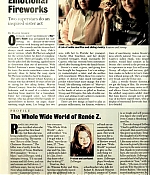|
Simply Streep is your premiere source on Meryl Streep's work on film, television and in the theatre - a career that has won her the praise to be one of the world's greatest working actresses. Created in 1999, we have built an extensive collection to discover Miss Streep's body of work through articles, photos and videos. Enjoy your stay.
|
Celebrating
25 years
of SimplyStreep
|
|
Review: Emotional Fireworks
Newsweek ·
January 13, 1997
· Written by David Ansen
|
Onstage, Scott McPherson’s Marvin’s Room was acclaimed for subverting its disease-of-the-week premise with bracing and unexpected humor. The comedy and the drama don’t always mesh smoothly in Jerry Zaks’s movie version, which McPherson adapted for the screen before he died of complications of AIDS. There are laughs, to be sure, but the jokes feel like frosting, applied more as distraction than out of necessity. With Rachel Portman’s music tugging too hard for tears, the movie sometimes comes dangerously close to being the soap opera McPherson worked so hard to disguise.\nThe sick one is Bessie (Diane Keaton), a woman who has devoted 20 years of her life to caring for her ailing father, Marvin (Hume Cronyn). Now she’s diagnosed with leukemia, and in need of a relative with matching bone marrow for a transplant. Enter her estranged sister, Lee (Meryl Streep), who has always fled her family responsibilities in horror. An angry, chain-smoking single mom, Lee brings her two sons with her to Florida: her youngest, Charlie (Hal Scardino), and her deeply troubled teenager, Hank (Leonardo DiCaprio), who has recently been institutionalized after burning down the family house. Bessie’s a saint, a giver, and giving love has brought her happiness. Lee’s an unhappy cosmetologist, a taker, and she seethes with resentment. When these two come together, it doesn’t take much foresight to predict whose heart must change. But if the broad, life-affirming outlines of “Marvin’s Room” are familiar to the point of banality, in the hands of actors as gifted as Keaton, Streep and DiCaprio, this tale of noble sacrifice and sibling rivalry achieves moments of real poignancy and power. There are few things as hard to play as genuine selflessness, but Keaton, without a trace of sanctimony, makes Bessie’s goodness utterly natural. You can see why DiCaprio’s sullen Hank, who despises his mother, would find comfort in his aunt Bessie: she’s rooted in the present and open to experience in ways Lee will never know. Streep, all edges and nervous, guilty motion, makes us believe in Lee’s transformation without going soft. She’s a tough, abrasive broad, and she’ll stay one. Zaks, a terrific theater director, hasn’t yet got the hang of film. He overworks the close-ups, hits too many notes on the head and allows Gwen Verdon to brim over as the addled, soap-opera addict Aunt Ruth. But Zaks knows enough not to get in the way of his three superb stars, who put on a display of emotional fireworks that is lovely to behold.










